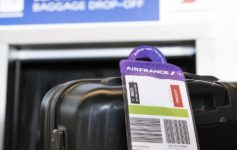I spend hours on the phone each week speaking to different airlines and loyalty programs from around the world. The single most important time-saver: the phonetic alphabet.
I was on the phone last night with Asia Miles (Cathay Pacific) booking an award ticket for a client. These agents tend to be well-trained with a good command of the English language, but unfortunately not last night. It was nearly impossible to comprehend the agent and if it wasn’t for spelling out passenger names with the phonetic alphabet, I’m sure the reservation would have been screwed up.
It’s not just Asia Miles, of course. I use the phonetic alphabet when speaking to any airline. The similarity of certain consonants in the English language makes this essential.
Once I dealt with a Delta agent who thought she was being cute by employing a mnemonic device to a record locator. The code was DHA77P and she said, “You’re code is going to be Diana has a 77 Pinto”
Uh…
“D-H-A-77-P. You know, like Diana has a 77 Pinto.”
Another time I worked with a Bible-belt US Airways agent from North Carolina who substituted standard phonetic characters for books of the Bible. “Your record locator is Revelation, Jude, Deuteronomy, Numbers, Malachi, the number 4.”
The beauty of the phonetic alphabet is that it is universal, or at least near-universal. If you memorize and use the code below you should have reduced trouble (notice I don’t go so far as to say no trouble!) communicating with any airline reservation agent from around the world:
| LETTER | PHONETIC | LETTER | PHONETIC | |
|---|---|---|---|---|
| A | Alpha | N | November | |
| B | Bravo | O | Oscar | |
| C | Charlie | P | Papa | |
| D | Delta | Q | Quebec | |
| E | Echo | R | Romeo | |
| F | Foxtrot | S | Sierra | |
| G | Golf | T | Tango | |
| H | Hotel | U | Uniform | |
| I | India | V | Victor | |
| J | Juliett | W | Whiskey | |
| K | Kilo | X | X-ray | |
| L | Lima | Y | Yankee | |
| M | Mike | Z | Zulu |
CONCLUSION
While agents may make up their own words, they’ll all understand the table above.
Often, dealing with a reservation agent is already difficult enough. Save yourself a little headache by using the codes above to spell out names and record locators. It will Sierra-Alpha-Victor-Echo your Sierra-Alpha-November-India-Tango-Yankee.





Great post. Solid, useful info from an expert!
One note to add–David is usually used in place of Delta in the airline industry as there are obvious potential confusion points!
Even incorrect use of the zulu alphabet drives me nuts. When an agent gives me phonetics for each letter in a record locator I always repeat back with the correct names.
http://viewfromthewing.boardingarea.com/2015/09/01/get-that-airline-record-locator-right-away-and-use-the-correct-phonetic-spelling-darn-it/
Which may make me kind of a jerk, though I never call them out for it explicitly.
I do the same thing! 😉
I always use phonetics as well. It is indeed rather interesting the odd words that many agents use, but I do the same and repeat back with the correct ones haha.
Nato phonetic alphabet, which adapted by ICAO, thus the use in your ticket and booking code.
Some countries may have their own local version. For example in Malaysia, L shall be London instead of Lima, since Lima is number 5 in local language. Other country may have it as well.
Tough most call center outside USA would love to talk in English upon knowing you didn’t speak local language, some discrepancies may appear. Let’s just say its a habit of tongue.
Once had a call center agent state “Q, as in Cuba”. No joke
It is not just the airline reservations call centers outside the USA, which drive me up the wall; call centers in general, outside of the USA, whose representatives don’t have a rudimentary knowledge of English, and in fact, murder the English language, should not be in the positions that they are in. In many instances (in addition to the telephone connection being bad), the individuals not only can’t speak correct English, but it is difficult to understand them, and vice-versa. Once in a blue moon, I’ll be lucky, and connect with a call center in Canada. Most of the time, though, it is most unpleasant to deal with someone with a heavy accent. The reason that this occurs time and time again, and the reason that it is permitted by large corporations is found in the words of the great actor Clark Gable; he stated, and I’m paraphrasing “Frankly, they don’t give a damn”!”